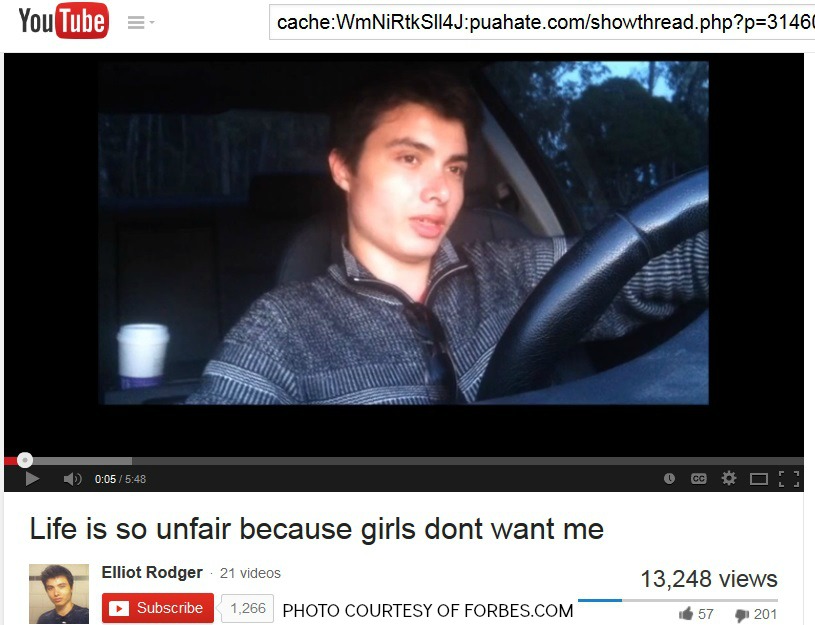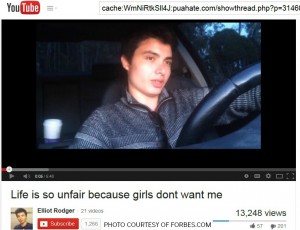

On May 23, seven victims were found dead as the result of a mass murder in California. The tragedy came as a great shock to the families involved as well as the rest of the world.
The fateful series of events began Thursday, May 22, with a chilling video post by Elliot Rodger, the suspected killer. In the video entitled “Retribution”, Rodger sits in his car alone and spends about 7 minutes explaining to viewers how he is plagued by loneliness and constant rejection from women.
In Rodger’s video, he arrogantly states, “You girls have never been attracted to me. I don’t know why…but I will punish you all for it. It’s an injustice, a crime, because I don’t know what you don’t see in me. I’m the perfect guy. Yet you throw yourselves at all these obnoxious men. Instead of me. The supreme gentleman. I will punish all of you for it.” He also throws in a few creepy laughs, which makes the unsettling video even more disturbing.
In order to prove that he truly is the “supreme gentleman” he claims he is, Rodger goes on to explain his plans for murdering these female rejectors in detail, saying that he will “slaughter” multiple sorority girls and then take to the streets and “slay” random college students. Although Rodger did not end up killing quite as many people as he claimed he would, he managed to take six innocent lives as well as his own.
According to The Boston Globe, before his death, Rodger was a part of a “Pick-Up Artist Community.” In these online communities, men with offensive ideals of women share and brainstorm tips on how to easily “pick up” random girls and sleep with them. Rodger’s view of women and his violent response to their rejection of him ignited feminist hashtags on Twitter, like #YesAllWomen. The hashtag allows women of all ages to share stories of times they felt scrutinized, objectified or unsafe in the presence of men and why it shouldn’t have to be that way. #YesAllWomen still stands strong on Twitter a week later, despite the negative response from men. Some users of the #YesAllWomen hashtag claim that the backlash only proves why the feminist Tweets are necessary in the first place.
In addition to the hashtags, there’s been a lot other talk about the importance of equal respect and treatment towards women, but there hasn’t really been much discussion of what caused Rodger to have those unrealistic ideals of girls in the first place. Ann Hornaday, a writer and critic for the Washington Post, blames a lot of it on media in one of her most recent articles.
In her article, Hornaday discusses how “for generations, mass entertainment has been overwhelmingly controlled by white men, whose escapist fantasies so often revolve around vigilantism and sexual wish-fulfillment.” More specifically, Hornaday calls out movies like, “Neighbors,” in which college life is overly glorified. In addition, a majority of the girls that interact with the fraternity boys in the film are portrayed as “pleasurable” objects. Hornaday believes that movies like this “powerfully condition what we desire, expect and feel we deserve.”
Part of the reason Hornaday believes this is because when society see films, they automatically connect themselves to the outrageously perfect main characters. After they have projected themselves onto the characters, they begin to mix their own stories with those of different films, regardless of how extreme and bizarre they might be. This usually leads people to start expecting the same Hollywood-created scenarios to happen to them in real life. Hornaday makes a good point when she says, “what may start out as harmless escapist fantasies can, through repetition and amplification, become distortions and dangerous lies.”
Hornaday is definitely right to blame some of society’s messed up values/ethics on the media, but I think she feels that only men are influenced by it. While misogyny does play a big part in the media (just look up the lyrics to any rap song, for example) women are at fault, too. Most become filled with ideas of “prince charming” and “happily ever afters” from watching so many cheesy chick flicks and reading so many romance novels. It’s not just movies and books that do this, either; it’s also music. Both misogyny (the hatred of women) and misandry (the hatred of men) are prevalent in all kinds of music.
The messages sent out to men and women about the opposite sex are often times too impractical and need to be substantially improved. Based on the killings by Rodger, those “lies” can even help to bring about violent thoughts and actions. Until improvements are made as far as media goes, society should really start to focus on being more realistic with one another and treating everyone with kindness and respect, regardless of their gender.
a very serious and disturbing video